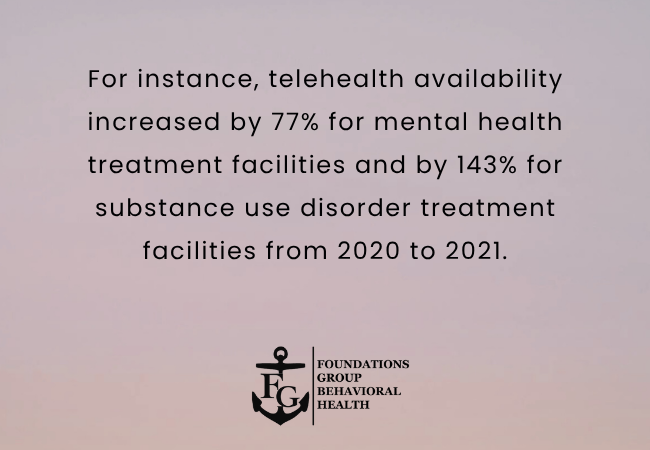Telehealth has become an essential tool in modern healthcare, and its impact is particularly evident in outpatient mental health therapy. The shift towards digital platforms for therapy sessions has expanded access to care, making it easier for individuals to receive support for mental health challenges, especially during times of crisis. However, while telehealth presents numerous opportunities, it also comes with its unique set of challenges. This blog will explore how telehealth is transforming outpatient therapy, the benefits it brings, the challenges it presents, and the clinical best practices that can make telehealth a successful and effective part of mental health care.
Opportunities in Telehealth for Outpatient Mental Health Therapy
Telehealth provides the ability to deliver Outpatient Mental Health Therapy Massachusetts remotely, which is particularly advantageous for individuals who live in underserved or rural areas. It eliminates geographical barriers, allowing clients to access therapy without the need for travel. Additionally, telehealth can make therapy more convenient, especially for clients with busy schedules, physical disabilities, or transportation limitations.
For individuals in recovery or those who need regular mental health support, telehealth can be a consistent and reliable option. Many individuals struggling with mental health disorders, such as Anxiety Treatment Program Massachusetts, find that they can receive the necessary treatment while still managing their daily responsibilities.
Telehealth has also proven to be an effective tool for supporting Trauma Disorder Treatment Program. Individuals who experience trauma can find comfort in accessing therapy from their own homes, where they may feel safer and more relaxed. This setting can lead to a more productive therapeutic session, allowing clients to share their experiences more freely than in a traditional office setting.
The flexibility of telehealth also allows mental health professionals to utilize different therapeutic approaches in a more accessible way. Cognitive Behavioral Therapy (CBT), dialectical behavior therapy (DBT), and other evidence-based modalities can all be conducted effectively via telehealth platforms. Therapists can offer individual and group therapy sessions, using video calls, phone calls, and even messaging features, depending on the client’s needs.
The Challenges of Telehealth in Outpatient Mental Health Therapy
While telehealth offers numerous benefits, there are also challenges that need to be addressed to ensure its success. One significant challenge is ensuring that both clients and therapists have access to the necessary technology. High-speed internet, a device with a camera, and secure software are required to conduct telehealth sessions. Without reliable access to this technology, some individuals may face difficulties participating in therapy.
Another challenge involves the potential for privacy and confidentiality issues. For telehealth sessions to be effective and ethical, it is essential that they occur in a secure, confidential environment. Therapists and clients need to take extra precautions to ensure that their sessions are not inadvertently overheard or intercepted. This is particularly important for sensitive topics that may be discussed during Mental Health Therapy.
The therapeutic relationship can also be affected by the lack of in-person interaction. While video calls allow for non-verbal communication, there are still elements of face-to-face interaction that are missed during telehealth sessions. For example, body language may not always be as clear through a screen, and subtle cues may be harder to detect. This can impact the therapist’s ability to fully assess the client’s emotional state and make adjustments to treatment.
Additionally, telehealth may not be suitable for every individual. Some people, especially those with severe mental health disorders or those in crisis, may require more intensive, in-person care. Half Day Treatment Program Massachusetts may be a more appropriate option for these individuals, as it offers structured, direct care in a therapeutic setting that telehealth cannot provide.

Clinical Best Practices for Telehealth in Outpatient Therapy
To ensure that telehealth is both effective and ethical, mental health professionals should follow clinical best practices when providing outpatient therapy through digital platforms.
- Ensure Secure Platforms and Privacy Protection
When conducting Outpatient Mental Health Therapy, therapists must use secure, HIPAA-compliant platforms for video and audio calls. This ensures that the client’s information remains confidential and that the session is private. Therapists should also remind clients about the importance of having a private, quiet space for therapy sessions to avoid any interruptions or breaches of confidentiality. - Establish Clear Boundaries and Expectations
When offering telehealth services, it is essential to establish clear boundaries and expectations for both the therapist and the client. This includes outlining how the sessions will work, the technology required, and the expectations for availability. It is also important for the therapist to check in with the client about their comfort with the telehealth format, especially if the client is new to virtual therapy. - Create a Safe and Supportive Environment
To support clients in Trauma Disorder Treatment Program, therapists must create a virtual environment that fosters trust and safety. This can involve checking in with clients at the beginning of each session to ensure that they are in a comfortable, private space. Therapists should also be mindful of the client’s emotional state, especially when discussing sensitive topics, and should provide additional support as needed. - Monitor Technological Challenges
Therapists should be proactive in addressing any technical issues that may arise during telehealth sessions. This includes checking the internet connection, ensuring the client has access to the platform, and troubleshooting any issues that may occur during the session. Therapists should also have backup communication options available (such as phone numbers) in case technology fails during a session. - Assess Suitability for Telehealth
Not all clients are suited for telehealth, particularly those with complex mental health needs. Therapists should assess whether Mental Health Therapy Massachusetts via telehealth is appropriate for the individual. In cases where telehealth may not be effective, therapists can suggest alternative treatment options, such as in-person therapy or residential care. - Maintain Consistency and Regularity
Just as in traditional therapy, it’s important to maintain consistency in scheduling and frequency of sessions. Regular sessions help build rapport, create structure, and promote progress. Ensuring that telehealth sessions are scheduled consistently helps clients stay engaged and allows therapists to assess progress effectively.
Why Choose Foundations Group Behavioral Health?
At Behavioral Health Treatment Center Massachusetts, we understand the power and potential of telehealth in improving mental health outcomes. Our approach is to use telehealth as a supplement to, not a replacement for, in-person care, ensuring clients receive the highest quality treatment tailored to their individual needs. Whether you’re engaging in Anxiety Treatment Program or recovering from trauma, we offer secure, supportive telehealth services that empower you on your journey to mental wellness.
We take great pride in providing a range of services designed to meet the needs of our clients, including Trauma Disorder Treatment Program Massachusetts, through telehealth, making our services accessible, flexible, and effective. Our experienced therapists use evidence-based practices and are trained in delivering care through telehealth platforms.
Conclusion
Telehealth in outpatient therapy is an invaluable tool that provides flexibility, accessibility, and convenience to individuals seeking mental health support. However, it is not without its challenges, particularly around technology, privacy, and the limitations of virtual interactions. By following clinical best practices and taking the necessary precautions, therapists can ensure that telehealth provides the same high-quality care as in-person sessions.
If you are interested in exploring telehealth services or have any questions about Outpatient Mental Health Therapy, we encourage you to contact us at Foundations Group Behavioral Health. Our team is dedicated to providing compassionate care tailored to your individual needs. Call us today 888.685.9730 to learn more about how our programs, including Anxiety Treatment Program, can support your mental health journey.
Frequently Asked Questions (FAQs)
What is telehealth in outpatient therapy?
Telehealth in outpatient therapy refers to providing mental health services through digital platforms, allowing clients to receive therapy remotely. This method includes video calls, phone calls, or even messaging services to deliver support to individuals from the comfort of their own homes.
How can telehealth help with mental health treatment?
Telehealth offers increased accessibility and convenience for individuals seeking mental health support. By eliminating geographical barriers, telehealth enables clients to access therapy sessions from anywhere, making treatment more consistent and reliable.
Is telehealth effective for treating trauma disorders?
Yes, telehealth has proven effective for individuals undergoing treatment for trauma disorders. By offering therapy in a private and comfortable environment, clients may feel more at ease when discussing sensitive topics, which can enhance the overall therapeutic process.
What are the main challenges of telehealth in mental health therapy?
The primary challenges of telehealth in mental health therapy include technological issues, ensuring privacy and confidentiality, and the lack of in-person interaction, which can sometimes make it harder to pick up on non-verbal cues. These challenges can be managed by using secure platforms and ensuring clients are in private spaces during sessions.
How can therapists make telehealth sessions effective?
Therapists can ensure effective telehealth sessions by using secure platforms, establishing clear expectations with clients, monitoring technological issues, and creating a safe, supportive environment for the session. They should also regularly assess whether telehealth is suitable for a particular client’s needs.








